- Home
- Sonya Hartnett
The Children of the King Page 5
The Children of the King Read online
Page 5
“For victory!” shouted Cecily.
“Don’t shout!” said her brother.
“Yes,” agreed Peregrine, “for victory.”
“Is victory more important than anything?” asked May.
“Not always,” said Peregrine. “But in this case, certainly.” To which the small girl nodded.
There was a knock, and the maid brought in the post, several envelopes for Mr Lockwood and a parcel each for the Lockwood children. “Oh!” Cecily gasped. “From Daddy!”
May cleaned out the contents of the eggshell while the parcels were opened. Humphrey Lockwood had sent a book of Shelley’s poetry to his son and a gold bangle to his daughter. With each gift came a letter in an envelope; Jeremy tucked his letter into his pocket but Cecily tore hers free and read. Dear Cecil-doll, I hope this letter finds you happy, and not thrown down the privy by your brother. No doubt by this time you are running Heron Hall with efficiency, and perhaps giving Peregrine cause to wish he’d never been born. Home is very quiet without you, but I am getting a lot of work done without interruption. I miss you Dolly, and enclose this bangle which I hope will remind you of me. I saw it in a shop window and it seemed right to buy something pretty when everything is so serious . . . “Oh, Daddy,” she sighed, sliding the bangle onto her arm. “Poor Daddy. What did you get, Jem? I got a bangle. Look, it’s lovely.”
She twirled her wrist so the gold caught the light. “It suits my white arm,” she decided. She looked at May. “Still no letter for you, May?”
“No.”
The kindness of Cecily’s nature rose up to give her trouble. “Maybe your mum was busy. I’m sure she’ll send something — maybe tomorrow?”
“It’s all right,” said May.
“And if not tomorrow, probably the next day. She wouldn’t have forgotten you — not yet.”
“Cecily! Leave her alone.”
“It’s all right,” repeated May.
But it was a sorry sight, the evacuee and her eggshell amid the ribbons and wrapping; it caused Cecily pain. A distraction occurred to her: “Uncle Peregrine, May was asking about those ruins by the river. What is that place? I’ve forgotten.”
“Snow Castle. You should be careful there. Ruins can be dangerous.”
“That’s what I said! Didn’t I, May?”
“Snow Castle.” May mused. “It sounds like something nice to eat.”
“That’s not its real name though, is it?” Jeremy folded the paper and put it aside. “That’s just what local people call it.”
Peregrine sat back in his seat, taking his teacup with him. Walls of sunlight boxed him in, making his chair a throne. “The true name of the castle isn’t known,” he said. “Flimsy things like words become lost in time. But some say the castle never had a name — that it was always a castle of no name. It was built at least five hundred years ago, maybe a hundred more.”
“Golly,” said Cecily.
“Hardly golly at all,” her uncle replied. “Old castles aren’t rare. Every well-to-do person’s house was a castle in those days, there were lots of them around. Most are ruins now, just broken stones and a few crumbling walls; even most of the grandest ones are lost. What does make Snow Castle unusual is the fact that much of its stone is marble — snow-white marble, originally.”
“So whoever built the castle must have been someone grand.”
Cecily swung to May, curls bouncing. “How do you know?”
The girl, challenged, blushed a little. “Marble comes from Italy, where Michelangelo lived. So only a rich person could bring it all the way here and use it to build a house.”
Peregrine smiled. “How do you know that, May? Do you have an interest in architecture?”
The evacuee blushed pinker. “My dad taught me things.”
“Is your father an architect? An artist?”
“No; but on weekends we used to go to the museum to see the paintings and the stuffed animals and the fossils, and he used to tell me things.”
“I’m scared of those stiff animals.” Cecily boggled her eyes.
“The animals were my favourite,” said May. “We always visited them first. I like the walrus. Then we see the mummy in the sarcophagus, he is Dad’s favourite. I like the mummy too. Then we visit the icons and the head-hunters, and after we’ve looked at everything we . . .” She paused, glanced up.
“You what?” asked Cecily.
The girl seemed to have forgotten what she meant to say. Then she spoke with a start. “We’d get ice-cream if it was a warm day, and chips if it was cold.”
She looked down at her plate. Peregrine Lockwood ate the last slice of pear, contemplating her. Jeremy said, “The land around here is full of artefacts — Iron Age metal, Roman glass. We’ll go digging if you like, find a gift for your father.”
Jealous Cecily said, “What would anyone want with a bit of old glass? Look, May, I’ve got an idea: we can share this bangle. I’ll wear it today and you can wear it tomorrow, and I’ll wear it the next day and you —”
“It doesn’t matter.” May raised her head. “You keep it, Cecily.”
“It suits your white arm,” said Peregrine.
“So if he isn’t an artist, what does your father do, May?”
“Before the war he was a school teacher.”
“A teacher.” Peregrine sighed. “And here you are, brain turning to mush.”
“She learned about Snow Castle,” Cecily pointed out.
Peregrine scoffed. “There’s a lot more to Snow Castle than those few facts. There’s an entire terrible legend around that castle. Some people say it is called Snow Castle not because of the stone it’s made from, but because its story is as hard as winter.”
“Really?” Jeremy’s eyebrows rose. “You’ve never told us this before.”
“I have not. You are children, and the tale is cruel. Unfit for childish ears.”
Jeremy made a face as if he’d never heard such rubbish. Cecily said, “You can tell us a cruel story — we’re brave! May’s not scared of anything, remember?”
“Tell it, Uncle Peregrine.”
The master of the house shook his head. “It’s a very long story, and I’m too busy for long stories.”
“You don’t do anything except read and write letters! That’s not being busy.”
“I’m busy thinking.”
“Thinking about what?”
“Things such as the past and the future.”
“Those aren’t important!”
“Then give us a clue,” said Jeremy. “Is the castle haunted?”
“Every castle is haunted. Hauntings are as common as cats. Ghosts are nothing to fear. It’s real life you should worry about.”
“So the story is about real people?”
“Yes, real people.”
“Children?”
“Some children, yes.”
“So it’s a true story,” said Jeremy. “It’s history.”
“I cannot vouch for its absolute truth, but it is certainly history. The story is almost as old as the castle itself.”
“Five hundred years old!” Cecily’s mind swam.
Jeremy leaned forward, scheming in his eyes. “Uncle Peregrine, what if you told us the story in pieces, just a bit now and then? That way, it wouldn’t take up too much of your time. And if the story is history, we’d be learning something — it wouldn’t matter that we’re not going to school.”
“Good idea!” cawed Cecily. “Then I wouldn’t be so stupid!”
Peregrine considered them, sipping his tea. The children watched him, intent as collies. His nephew knew his weakness: Peregrine Lockwood was clever, and like all clever people he liked to share his cleverness around. Yet he would not concede easily: “You’d whine when it became scary.”
“We would not!”
“You’d wake up screaming in the night.”
“We never would!”
Peregrine turned to May. “You’re the wisest child at the table. What’s your opin
ion?”
May said, “My dad used to tell stories.”
“And he’s not here now,” said Cecily, “so you’ll have to tell them instead, Uncle Peregrine.”
The man looked closely at the girl. “Would you like that, May?”
May’s fingertip circled the rim of her glass. “Yes,” she decided.
Peregrine sighed, as if much put-upon. “I suppose even a little education is better than none,” he said. “I cannot promise an instalment every day, mind you. I am not at your beck-and-call, and unlike you three loafers, I have things to do.”
Triumphant Cecily squiggled in her seat. “Tell it!” she screamed.
“No.” Peregrine placed his cup on its saucer, dusted his hands and pushed out his chair. “Now I’m busy. Tonight, after supper, we will begin. In the meantime, I wish you good day.”
He limped from the room and left them sitting at the table, their young faces buttered with sunshine, the last piece of toast standing, a lone soldier, cold on the rack.
Cecily lost sight of her protégée after breakfast, having gone to the bathroom to wash jam from her cuffs and returned to find May, whose cuffs were never jammy, absent-without-leave for the second time that morning. She ran through the house feeling not angry or disappointed but like a child in a department store who has turned to discover itself separated from its mother. One after another of the big rooms proved empty, however, and finally Cecily stopped, confused. A puzzled part of her put forward the idea that she’d invented the evacuee’s entire existence.
Byron barked, far away. Cecily spun like a rabbit and ran.
By the time she reached the cobbled yard, May and Byron were already way across the field, heading in the direction of the woods from which they had emerged that morning. “Wait!” Cecily shouted. “Wait for me!” She ducked past the gate and hared off over the grass, gratified to see that they’d heard and halted and were looking back. She could not understand why they hadn’t simply waited for her in the first place.
The earth was still slithery with dew, and the girl and the dog were further away than they had seemed — Cecily was puffing when she reached them. “Where are you going now?” she panted. “Back to those old ruins?”
May said, “You don’t have to come.”
“No, I’ll come. I need some exercise. At school we used to do exercises every morning. Star jumps — like this! I didn’t like it. Why are you carrying that plate?”
May was holding a dinner plate over which she’d draped a kitchen cloth. The cloth bulged with whatever lay hidden beneath it; Byron could not tear his eyes away. A thin breeze was blowing, and it blew strands of hair across May’s white face. She said, “Let’s go into the woods so they can’t see us from the house. Then I’ll show you.”
Cecily glanced back to Heron Hall. From this distance the house looked half its proper size. She and May would be, from its windows, tiny Kewpie dolls on the landscape. She looked at her shoes, which were new and now splattered with muck and torn grass. Nothing was good: yet Cecily was a follower, and she followed her companions at a clump.
There were too few trees — pallid alders with spindly arms, brawny ash with fleshy leaves, oaks as monolithic as Nordic warriors — to make a true forest; but frothy thickets of shrub and bracken grew between the trees, and the copse was thick enough to disappear into, and to hide Heron Hall from view. It was shadowy and still beneath the branches, and a dark bird flew clatteringly away. May wove through the undergrowth until the meadow beyond the woods was visible and sunlight was nosing the shade. Cecily was about to whine, “Aren’t you going to show me?” when the girl stopped, looking up at her with treasure-chest eyes.
“Can you keep a secret?”
“Of course!” Cecily huffed, although it was obvious to anyone, and certainly to May, that secret-keeping would tremble at the very edge of Miss Lockwood’s abilities.
Nevertheless the evacuee balanced the plate on one hand, and drew the cloth away. On the plate were breakfast leftovers: the last slice of toast and two eggs, a scarlet lump of blackberry jam and a greasy knot of butter, a scorched pikelet and, pride of the collection, a very chill-looking omelet. “I took it from the kitchen when Cook wasn’t looking.”
“I won’t tell. Why do you want it?”
“Promise again you won’t tell.”
“I promise-promise!”
“There are two boys hiding in Snow Castle,” said May.
Cecily absorbed this. She had always liked boys, and having a brother meant she knew a lot about them; but part of what she knew was that boys could have a rough, unpleasant side, and not merely the unpleasantness of Jeremy in his moods. Driving with her father around London’s streets, she’d seen boys of the wilder kind throwing stones and chasing each other, kicking fences and wrestling on the ground. She had no desire to make the acquaintance of boys like that — and boys who’d hide in ruins seemed likely to be the kicking kind. “What are they doing? Are they playing? Are they local boys?”
May said, “Wait and see.”
Cecily wasn’t absolutely sure she wanted to see; but she was no shrinking violet, and it would be humiliating to watch May march off unaccompanied, as she appeared certain to do. May Bright, Cecily was discovering, was not cautious. Perhaps it was because of all the museums. Places like that encouraged adventure and curiosity — too much, in some children.
They struck out over the field with Byron in the lead. With Heron Hall hidden by the woods behind them, it was easy to imagine they were utterly alone on the earth but for a few distant sheep who raised their horned heads to watch the dog trot by. The breeze made Cecily’s thoughts go to the overcoat she’d left on a hook behind the laundry door. To break the silence she said, “Parky, isn’t it? I wish I’d worn my wellies. Mama will be cross if I ruin these boots.”
May, who wore both coat and wellingtons, glanced at her companion’s feet. “You can wear mine.”
“But then you’d have to wear my boots. They’d still get wet and dirty.”
“I’ll wear bare feet,” said May.
Cecily baulked to discover she was keeping company with a barbarian. “You’ll step in sheep-do!”
“Sheep-do is just chewed grass.”
Cecily had rarely walked barefoot out of doors; May probably did it as often as she could. Cecily both envied such feet, and did not want to share their shoes. “My feet won’t fit your little boots,” she said. “Forget it.”
“What about your mother getting cross?”
“Oh, she’s always cross, I’m used to it. She’s always nice, but always cross. She lets me do whatever I want, but everything I do annoys her. She scolds me for being spoiled, but buys me lots of things. That’s funny, don’t you think? You can’t be sad and happy, but you can be mean and nice.”
“You can be happy and sad,” said May. “I am.”
Cecily looked at her reverently. “Are you sad but happy because your dad is a soldier?”
May creased her nose. “I’m always sad and happy about lots of things. It’s just the way I was made, I guess.”
Cecily grinned. Words came irresistibly to her. “Sometimes I want to pick you up and squeeze you,” she said.
“Everybody does,” sighed May.
The conversation had carried them downhill, and the earth had become rockier; they stepped from platter of stone to gnarly mound, from gravel bank to nest of shards, avoiding slimy rockpools in which mosquito larvae writhed. Soon they heard the piano-music of water — the river. A dragonfly veered in for a close look at Cecily, making the girls giggle. It was lovely to be rambling through fields with the convalescent sun rubbing their brows, with swallows skating the tufty earth and a river to intrepidly ford. London with its blacked-out windows seemed far away, forgettable.
The river, when they came to it, was shallow but broad. Byron waded across, saw that the children hadn’t followed, and waded back again on dripping paws. May and Cecily considered the rushing water. Rocks rose from it randomly,
a higgle-piggle of stepping-stones. May looked at Cecily. “I could carry you?”
Cecily snorted at the vision of the evacuee squishing beneath her like an ant into the riverbed. There was only one person in the world who’d be permitted to ferry her over the water, and that was her strong father. He being absent, Cecily took to the stepping-stones, and despite much wobbling made a fair job of the crossing, soaking just one stocking.
The river flowed in the basin of a steep ravine; when they’d climbed the far side, the girls saw the ruins.
Snow Castle had once been big — bigger than Heron Hall, although, as Mr Lockwood told them, not big by the standards of the time when it was built, when big meant astonishingly huge. Nonetheless it had been a castle, with all that this implies: it had had towering walls and turrets, beams as great as trees, arched doorways wide enough for processions to pass through, ceilings so cavernous that owls had nested in them. It had had wings and ramparts and thin windows from which to shoot arrows, internal courtyards, banquet rooms, hidden doors, secret passages. It had had a chapel and, in its bowels, a dungeon. It had housed sculptures and paintings, tapestries and cushions, carpets and carvings, its fortressed heart had been clad in gilt, silver, glass, gold, damask, ivory, ermine.
Now nothing but the barest remnants of that palatial past remained. The roof was gone, and what was left of the walls stood like tombstones in a neglected burial-ground of the titans, rising from the earth as skewed and shapeless as brawlers’ teeth. Some walls were gigantic, taller than trees; others were stunted as crones. Some had their stained faces turned to the sun, and cast hulking shadows behind them; other walls stood in these shadows and had done for centuries, and wore coats of festering slime. In many places the walls had collapsed and disappeared almost entirely, leaving only ragged stumps, knee-high, overgrown, to show where rooms had been.
And all around where the great castle had stood were hillocks of the hefty stones which had built it, no longer snow-white but the dull colour of dishwater, littering the ground and sinking gradually into it. Weeds grew around the toppled blocks, and insects made homes in them, and at night foxes used them as lookouts from which to yell hoarsely across the hills. On many of the stones could be seen traces of the mason’s tools that had cut them, but these scratches were the only sign of human hands. Nothing had survived to speak precisely of the people who had made this place their home: the paintings were vanished, the ermine was dust, only imaginings were left of the gold.

 Butterfly
Butterfly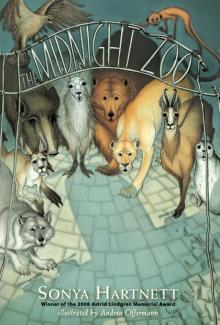 The Midnight Zoo
The Midnight Zoo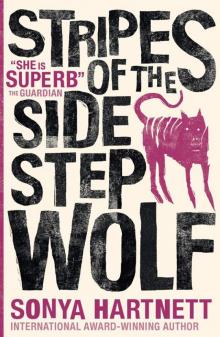 Stripes of the Sidestep Wolf
Stripes of the Sidestep Wolf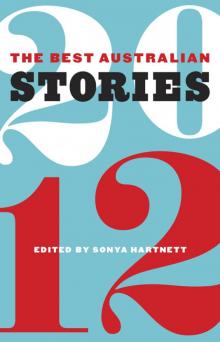 The Best Australian Stories 2012
The Best Australian Stories 2012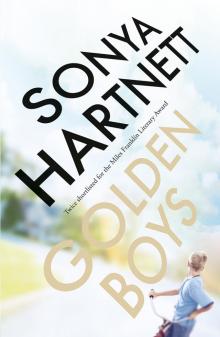 Golden Boys
Golden Boys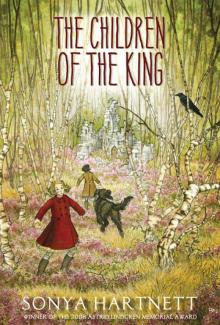 The Children of the King
The Children of the King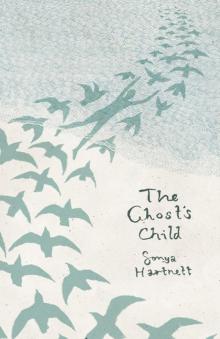 The Ghost's Child
The Ghost's Child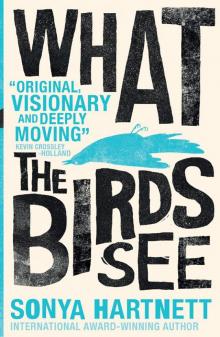 What the Birds See
What the Birds See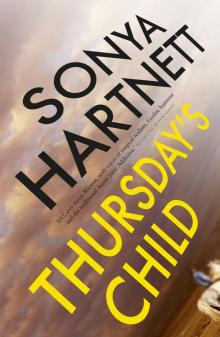 Thursday's Child
Thursday's Child